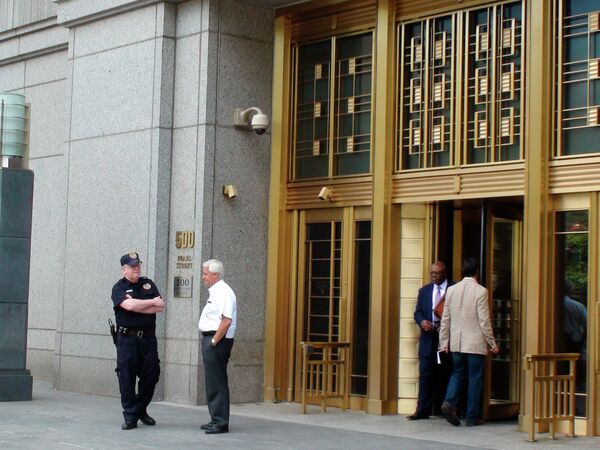Russia and the United States can now close the book on the recent spy scandal, one that has provided ample fodder to journalists and bloggers on both sides of the Atlantic, who have ridiculed this farcical cloak and dagger tale.
What else can you do with a story involving disappearing ink and buried suitcases filled with money in the age of e-mail and wire transfers?
Russian secret agent Mikhail Semenko was just talking to himself while sending a report to Moscow, unaware that he had been bugged by U.S. law enforcement - a scene reminiscent not so much of the spy stories by Le Carre as the plays of Shakespeare, in which villains are in the habit of thinking out loud.
But, really, has the response by Western and Russian analysts been any more relevant than the methods employed by these hapless spies?
In comments made right after the arrest of the Russian spy suspects, The Economist's Edward Lucas, a self-professed Russophile, claimed that the espionage ring presented a huge security threat to the West. He was especially alarmed that the alleged spies were instructed to penetrate American think tanks, despite the fact that the work of these organizations is generally open to the public.
Another prominent Russophile, Washington Post op-ed contributor Anne Applebaum, stretches Mr. Lucas' logic even farther.
"Why on earth would the Russian government spend years of its time and millions of its dollars on the education, upkeep and housing of a spy who might someday be able to collect some rumors?" she asked her readers. "Things you can find on the Web sites of The Post, the Brookings Institution and several dozen other institutions, all of whose blogs and articles can be thoroughly examined from an armchair in Moscow?"
A daring question, indeed. Here is how Ms. Applebaum proposes to answer it: "The KGB did not believe in the free circulation of information, either - the so-called free press was always held to be a tool of the capitalist exploiters."
So, according to Applebaum's logic, it was the Russian agents' mistrust of the American media that led them to seek out alternative, less accessible sources of information, even befriending members of the Clinton family's inner circle and other well connected people.
It's true that not all Western media outlets are trustworthy. For example, one should beware of commentators who have spent the past fifteen years expounding on the rebirth of Russia's imperial ambitions in the post-Soviet space. And don't believe what you read about Russia's intention to invade the Crimean peninsula, now part of Ukraine, or Moscow's role in the overthrow of the Kyrgyz government and the ensuing unrest.
Here in Russia there are also political analysts guilty of presenting a distorted picture to their readers. Beware of amateurish geopolitical research centers - whose staffs often consist of just a few fellows - that produce report after report advising the Russian government to form an anti-American alliance with China, or warning of U.S. plans to take Siberia from Russia. It is nonsense, but dangerous nonsense all the same. And yet these irresponsible analysts are consistently given a platform. They are invited again and again to give press conferences and to meet with editorial boards, and they never seem to lack funding, despite the fact that their way of thinking is every bit as anachronistic as secret messages written in disappearing ink.
U.S.-Russian espionage is an anachronism, but so, too, is the policy behind it. Thankfully, this policy is gradually fading away, and the new "reset" policy has provided a quick, face-saving solution, which has kept the scandal from doing permanent damage to the U.S.-Russian relationship.
We now know the sequence of events culminating in the spy swap. President Barack Obama was informed of the spy ring's existence at least several weeks before their arrest, but he did not order their arrest until his Russian counterpart, Dmitry Medvedev, returned home from an official visit to the United States. Immediately after the arrest, the Americans passed on the indictment materials to Russia's Foreign Intelligence Service. The Russian Foreign Ministry chose not to stoke the flames of the scandal, and instead quietly acknowledged that the spy suspects are, indeed, Russian citizens. A swap was proposed soon after - all in all a sensible, businesslike approach.
Apparently, the Obama administration has realized that Russia poses no threat either to the U.S. or its neighbors. Georgia is perhaps the only country with any reason to fear Russia, and only because its president, Mikheil Saakashvili, might launch another crazy military escapade.
Obama understands Russia's true intentions, and this allowed him and his team to dispatch the spy problem in a quick and diplomatically correct manner. They probably view this group as part of George W. Bush's legacy. After all, the Russian "moles" became U.S. residents when Bush was still in the White House. Now there's a man that needed to be kept under close surveillance.
The opinions expressed in this article are the author's and do not necessarily represent those of RIA Novosti.
MOSCOW. (RIA Novosti commentator Dmitry Babich)

